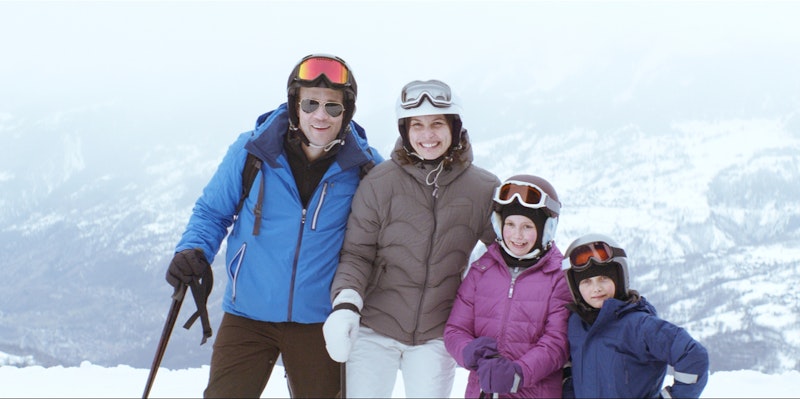Force Majeure is the Swedish Oscar entry for Best Foreign Film; why is anybody’s guess. The film excels at being as bland as a furniture commercial, with no real depth or development to speak of, and it passes by at a glacial pace. The premise is so thin, so very “…that’s it?” A family—mother, father, daughter, son—are on holiday at a French ski resort. Everything is very nice and everybody is very young—the kids are around seven and the parents can’t be past 40. They’re photogenic and commercial-ready, with absolutely nothing to work with. Early on, the family’s eating lunch on an outdoor balcony by the Alps. It’s framed like a postcard, the mountains and snow looking closer to Far Cry 4 than any reality I’ve ever seen. It plays out in one shot: a minor avalanche begins in the distance, and all the tourists eating on the deck look on bemused, unsure what it is at first, and we watch the mood slowly turn from mild bemusement to confusion to complete panic as an enormous ball of snow hurtles toward the innocents. In those chaotic few moments, the father runs inside like a chicken, abandoning his wife and children. Luckily, no one is hurt—just covered in show and a bit shaken. Later on, at dinner with friends, the husband won’t cop to running away and leaving his wife to protect their two children, and this is what we spend the next hour and a half mulling over.
I had serious déjà vu watching Force Majeure. You’ve seen this movie a thousand times. It’s subtle to a fault, to the point where you doubt there’s anything beyond the arms-length the filmmakers keep you at. It’s not a bad set-up, but there’s no meat on the bone: we never get to know anybody in the movie. The kids may as well be mannequins, and are severely under-utilized. The boy has one excellent line about halfway through: at the top of the ski lift, his father asks him what’s wrong—he shouts back “I’m worried you and mom are going to get divorced!” The father has nothing to say. It’s a devastating read, but there’s no weight to the situation. The father’s intense stubbornness and refusal to admit he ditched his family plays like slapstick, not like the mercurial and disturbing reality it is.
There’s the obligatory pseudo-intellectual dialogue, about how monogamy is flawed with a character that appears for exactly one scene. The film doesn’t allow us to see or get to know anybody but the family—how long can you stomach watching a couple fight passively aggressively while a chain-smoking janitor looks on? This movie has no pulse: the husband is so meek and his wife acts stunned and powerless, until the very end, when she purposefully falls in the snow, allowing her partner to pick her up and the family lived happily ever after. Commentary on upper middle class values? Force Majeure has as much to say about family values as an IKEA commercial.
—Follow Nicky Smith on Twitter: @MUGGER1992

